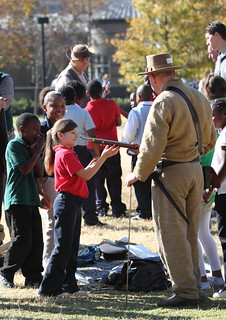I wrote this in reflection upon a conversation I had with a friend who was heading off for a weekend of protesting against the U.S. Government's "School of the Americas". There was the potential that my friend would be arrested, but there was also the general sense that it would be an exhausting and draining event. I asked her about why she was doing it, and a wonderful conversation ensued. These are some of the thoughts that remain. It's not done yet, thus the weak ending.
In every good conversation, the participants ideally exhibit a mutual desire to communicate their thoughts, share their ideas, and help the other participants to understand what they are trying to say. The conversation takes place because all of the participants recognize the significance and benefit of engaging in conversation with the other participants to communicate but also for the sake of conversation itself. The conversation is able to take place because all of the participants recognize that the other participants share the desire to engage in conversation.
In every good argument or debate, the participants ideally exhibit a mutual desire to convince the other participants that one view on a particular issue or series of issues is more appropriate, suitable, correct, or right than another view on the same issue or series of issues. The participants in an argument attempt to achieve this goal by explaining and detailing the point of view that they support in the context of opposing or refuting the points of view of the other participants, or sometimes affirming some parts and opposing other parts of a generally opposing point of view. Arguments and debates take place because participants recognize the opportunity to gain from discovering or acknowledging a particular point of view as more appropriate, suitable, correct, or right than another, whether it be the gain of personal knowledge, argumentative victory over another participant, or some other form of gain (not necessarily a positive gain).
Arguments are able to take place because participants recognize a need or desire to engage in the process of attempting to determine a more correct or appropriate point of view on a particular issue. This need or desire can arise from external pressures, personal passion about the issue or the argument itself (sometimes leading to physical combat), mechanical process, or any number of other sources. In all cases, participants recognize one or more of the other participants as being worthy of engaging in the argument or debate; they accept that the participants have a valid place in the process of argument, they recognize that the argument or debate has the potential to benefit themselves and possibly the other participants, and acknowledge respect (or present a façade of respect) that the other participants are suitably equipped to engage in the argument.
In every protest or act of civil disobedience, the participants making the protest or committing the act of civil disobedience exhibit a mutual desire to express an opinion about a particular issue or series of issues. The nature of protest and civil disobedience do not necessarily require that the parties holding, authorizing, enacting, or maintaining the views being protested against voluntarily participate in the event or even recognize the event as a valid "conversation" or "argument" as they were defined above. In this sense, it is not a conversation between two or more willing participants, but only an act of expression by participants representing only one point of view, directed at the parties holding, authorizing, enacting, or maintaining the opposing views.
This may be the case for several reasons. The opposing party may have refused the request of the participants to engage in a conversation or debate on a particular issue. The participants may have previously engaged in a conversation or argument that did not reach conclusion satisfactory to one or more of the participants. The protesters may desire to surprise or intimidate the opposing participants by initiating the protest or act of civil disobedience without advance notice. The protestors may not feel that they have available to them appropriate means by which to engage in a conversation or argument with the opposing parties, due to various power structures, logistical concerns such as time and place, or other factors.
By engaging in protest or acts of civil disobedience, these participants do, however, make the opposing parties a part of the conversation or argument, albeit unwillingly, in the following manner:
- The protesters imply a degree of responsibility for engaging in a conversation or acting lies with the opposing party;
- The protesters acknowledge that the opposing party is the most suited for taking on the role as an authoritative participant in a discussion on the issues in dispute;
- The protesters acknowledge the opposing party's authority or right or obligation to deal with the issues in dispute.
There are negative consequences associated with this approach to a conversation or argument. Because the opposing parties may not desire to be unwilling participants, they may react to the acts of protest or civil disobedience unfavorably. The structures (governmental, social, or otherwise) of the location in which the protest takes place may require or facilitate that the protesters` actions be halted or oppressed. Protesters or persons performing acts of civil disobedience may be subject to immediate consequences such as incarceration, injury, and death, or long-term consequences such as social displacement, internal conflict, or others.
In the sense that some participants are brought in unwillingly, protest or civil disobedience happens because the protestors recognize the potential for their actions to directly or indirectly impact the views and actions of the opposing parties. By participating in protest or civil disobedience, the participants exhibit a degree of respect for the opposing party to recognize, process, acknowledge, and act as a result of this impact. While the protesters may not necessarily place all responsibility for such processing and/or action with the opposing party, the notion of expectations between participants (be they willingly so or not) does arise.
Protest or civil disobedience are appropriate, then, when the potential for this impact on opposing parties outweighs the potential negative consequences of action. Protest or civil disobedience is successful when the opposing parties become willing participants in the conversation or argument about the issues at hand because they have recognized the nature or depth of the impact on them.
 One of the benefits of education is that it can provide people with the tools, perspective and knowledge they can use to meet their needs without resorting to intimidation, theft or violence.
One of the benefits of education is that it can provide people with the tools, perspective and knowledge they can use to meet their needs without resorting to intimidation, theft or violence.

